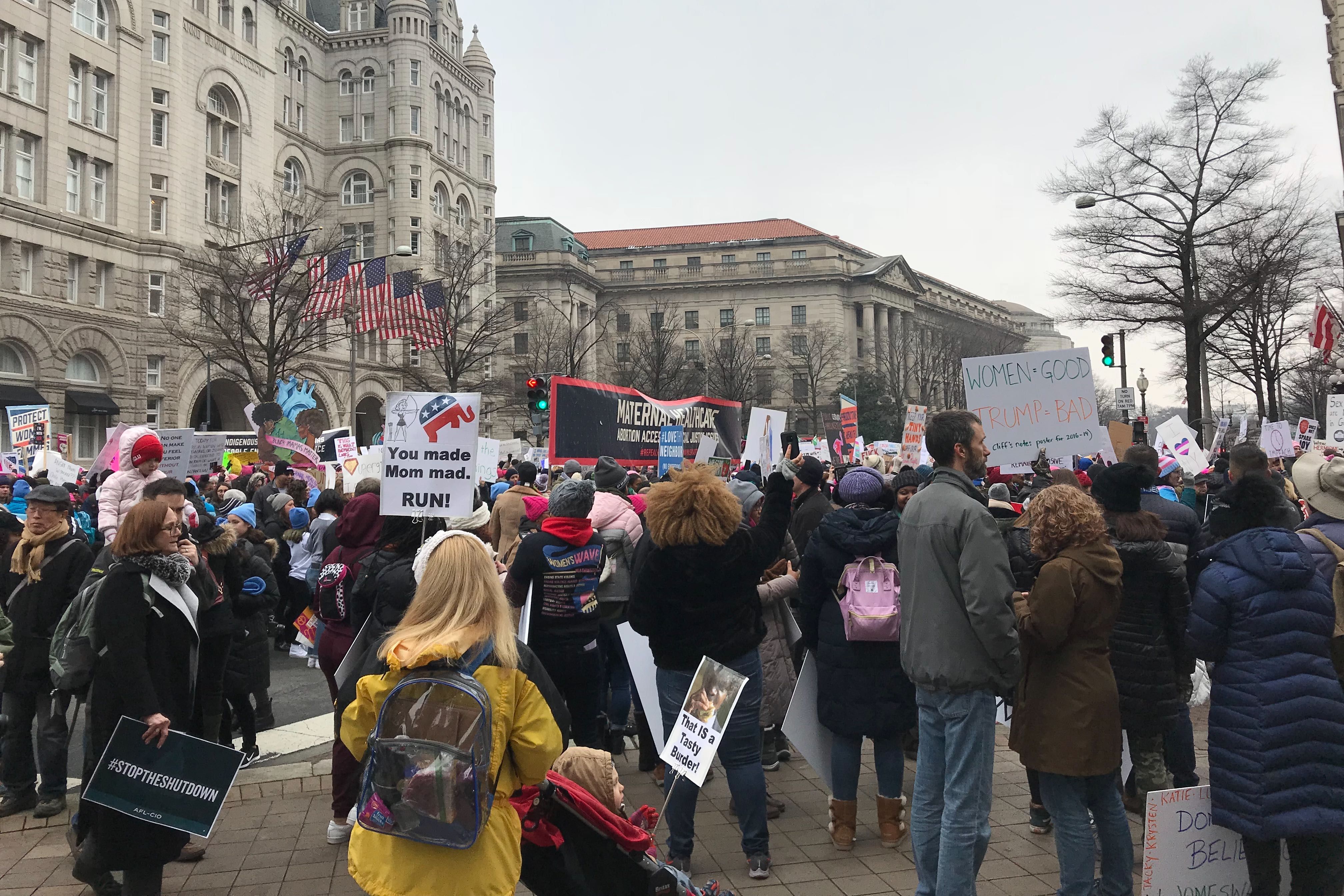WASHINGTON — After attending the first two Women’s Marches in Washington, D.C., University of Maryland student Natania Lipp was excited for the third one on Saturday — but she still felt conflicted about the experience.
The third annual Women’s March — which saw thousands of attendees, including several students from this university — was shrouded in controversy.
After reports that Women’s March board members shared anti-Semitic comments behind closed doors, several organizations, including the Democratic National Committee, withdrew their sponsorships of the event. One of the march’s co-founders, Teresa Shook, called for the current organizers to step down.
Lipp, who is Jewish, questioned how she fit into this year’s event. She was “really hurt” the board hasn’t publicly condemned Nation of Islam leader Louis Farrakhan, whom the board’s co-president, Tamika Mallory, has outwardly praised. Farrakhan has compared Jewish people to termites and praised Adolf Hitler.
“This year, it left me feeling a lot more conflicted about where my space is as a Jewish white women,” said Lipp, a senior psychology major. “I feel partially inspired, and partially like I still need to process what’s going on in the women’s movement.”
[Read more: “Moving and beautiful”: UMD students join 500,000 for Women’s March on Washington]
While the march’s organizers as a whole have stated their support for Jewish members of the movement and rejected anti-Semitism, Mallory herself has refused to condemn Farrakhan, but said Tuesday she doesn’t “agree with many of Minister Farrakhan’s statements.”
The march — which comes amid a nearly one-month government shutdown — was buoyed by the results of November’s midterm elections, as a record 102 women were elected to the U.S. House of Representatives.
Yet even with the increased representation in Congress, some women at the march felt an even greater dissonance between them and their government than in years past.
Alexandra Russell, a D.C. native and volunteer at the event, said she felt more “rage” at this year’s events, given recent Trump administration policies, including the separation of migrant children from their families at the Mexican border, and the president’s repeated calls to “build a wall” along the Southern border.
She pointed to a button on her jean jacket. The button, which called for reproductive rights, was 30 years old, she said.
“They’re rolling back civil rights that took many decades to get,” Russell said. “And I’m still fighting.”
[Read more: “We’re going to be the future”: UMD students take to DC in nationwide March for Our Lives]
Lipp felt this year’s event had a “different energy” from previous iterations — with less music and fewer attendees and speakers.
At last year’s Washington march, the speakers included elected officials such as now-Speaker of the House Nancy Pelosi (D-Calif.) and 2020 presidential candidate Sen. Kirsten Gillibrand (D-N.Y.). On Saturday, only one elected official spoke in D.C. — Nina Turner, a former Ohio state senator.
Despite the change, intersectionality remained a key theme of Saturday’s march. Speakers and signs called for the empowerment of women who have been marginalized — whether by race, religion or sexual orientation — and marchers brought a wide range of causes to match.
Clarence Patterson, a bus driver from New York, said he was there to support labor, carrying a sign saying “union strong.” Taylor Cook, a freshman from the University of South Florida, handed out copies of a socialist newspaper named Fight Back! to passersby.
And Ethan Tobin, a junior at North Carolina’s Appalachian State University, said he attended the march to support refugees. Tobin came to the march dressed as Jesus, cradling a sign that said “TRIED TO COME BACK — I GOT DETAINED IN CUSTOMS.”
A small group of anti-abortion activists attended the march as well, carrying signs emblazoned with pictures of fetuses. They were often met with chants of “my body, my choice.”
April Goggans, an organizer with Black Lives Matter DC, emphasized the diversity of feminists in a speech on stage.
“We as black women can be wherever we want to be, because we say so,” Goggans said. “White women do not own feminism, and if you want to know why, it’s because this black woman … says so.”
Chris Mylod, a senior mechanical engineering major at this university, said he hadn’t been to a protest before, but decided to attend this one with a friend. Mylod said he was impressed by the unity he saw at the march, despite the wide breadth of goals.
“There’s a lot of good people leading the charge for women’s rights, and I’m looking forward to seeing where they take it,” Mylod said. “I’ll definitely be going next year.”
As Lipp marched down the streets of Washington, D.C., she held a purple-lettered sign emblazoned with a quote attributed to poet Audre Lorde: “I am not free while any woman is unfree, even when her shackles are different from my very own.”
It was fitting for the occasion — even as Lipp felt unsure about the movement, she never hesitated to take to the streets alongside women of different backgrounds and experiences.
“It’s about the women. I do stand for LGBT, [people of color], immigrant women,” she said. “I still feel conflicted about how I feel about the leadership, but that doesn’t change how I feel about standing up for marginalized women, and I’ll still attend events like this that will support women.”



